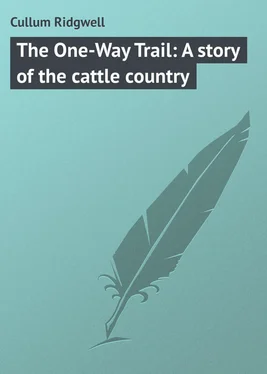Ridgwell Cullum - The One-Way Trail - A story of the cattle country
Здесь есть возможность читать онлайн «Ridgwell Cullum - The One-Way Trail - A story of the cattle country» — ознакомительный отрывок электронной книги совершенно бесплатно, а после прочтения отрывка купить полную версию. В некоторых случаях можно слушать аудио, скачать через торрент в формате fb2 и присутствует краткое содержание. Жанр: foreign_prose, foreign_adventure, на английском языке. Описание произведения, (предисловие) а так же отзывы посетителей доступны на портале библиотеки ЛибКат.
- Название:The One-Way Trail: A story of the cattle country
- Автор:
- Жанр:
- Год:неизвестен
- ISBN:нет данных
- Рейтинг книги:4 / 5. Голосов: 1
-
Избранное:Добавить в избранное
- Отзывы:
-
Ваша оценка:
- 80
- 1
- 2
- 3
- 4
- 5
The One-Way Trail: A story of the cattle country: краткое содержание, описание и аннотация
Предлагаем к чтению аннотацию, описание, краткое содержание или предисловие (зависит от того, что написал сам автор книги «The One-Way Trail: A story of the cattle country»). Если вы не нашли необходимую информацию о книге — напишите в комментариях, мы постараемся отыскать её.
The One-Way Trail: A story of the cattle country — читать онлайн ознакомительный отрывок
Ниже представлен текст книги, разбитый по страницам. Система сохранения места последней прочитанной страницы, позволяет с удобством читать онлайн бесплатно книгу «The One-Way Trail: A story of the cattle country», без необходимости каждый раз заново искать на чём Вы остановились. Поставьте закладку, и сможете в любой момент перейти на страницу, на которой закончили чтение.
Интервал:
Закладка:
The architect of Barnriff–if he ever existed–was probably a drunkard, not an uncommon complaint in that settlement, or a person qualified for the state asylum. The inference is drawn from strong circumstantial evidence, and not from prejudice. As witness, the saloon seemed to have claimed his most serious effort as a piece of finished construction. Here his weakness peeps through in no uncertain manner. The bar occupies at least half of the building, and the fittings of it are large enough to accommodate sufficient alcohol for an average man to swim in. His imagination must have been fully extended in this design, for the result suggested its having been something in the nature of a labor of affection. The other half of the building was divided up into three rooms: a tiny dining-room (obviously the pleasures of the table had no great appeal for him), a small bedroom for the proprietor (who seemed to have been considered least of all), and one vast dormitory, to accommodate those whose misfortunes of the evening made them physically incapable of negotiating the intricacies of the village on their way home.
Of course, this evidence might easily have been nullified, or even have been turned to the architect’s favor, had the rest of the village borne testimony for him. A clever counsel defending would probably have declared that the architect knew the people of the village, and was merely supplying their wants. Of course he knew them, and their wants–he was probably one of them.
However, the rest of the village was all against him. Had he been an abstemious man, there is no doubt but the village market-place would have been a square, or a triangle, an oval, a circle, or–well, some definite shape. As it was, it had no definite shape. It was not even irregular. It was nothing–just a space, with no apparent defining line.
Then there were no definite roads–at least, the roads seemed to have happened, and ran just where the houses permitted them. It was a reversal of ordinary civilized methods, which possibly had its advantages. There were certainly no straight lines for the men-folk to walk after leaving the saloon at night for their homes.
As for the houses which composed the village, they were too uncertain to be described in any but a general view of their design, and their grouping. In the latter, of course, the evidence was all against the designer of the place. Who but a madman or a drunkard would set up a laundry next to the coal yard?
Then another thing. Two churches–they called them “churches” in Barnriff–of different denomination, side by side. On Sundays the discord that went on was painful. The voices of the preachers were in endless conflict through the thin weather-boarding sides, and when the rival harmoniums “got busy” there was nothing left for the confused congregations but to chant their rival hymns to some popular national tune upon which they were mutually agreed beforehand. The incongruities of this sort were so many that even the most optimistic could not pass them unheeded.
As regards the style of the buildings themselves, the less said about them the better. They were buildings, no one could deny that; but even an impressionist painter could claim no beauty for them. Windows and doors, weather-boarding, and shingle roof. One need say no more, except that they were, in the main, weatherproof. But wait. There was one little house that had a verandah and creepers growing around it. It was well painted, too, and stood out amongst its frowzy neighbors a thing approaching beauty.
But Barnriff, as a residential hamlet, was hardly worth considering seriously. It was a topsyturvy sort of place, and its methods were in keeping with its design. It was full of unique combinations of trade. Some of them were hardly justifiable. The doctor of the place was also a horse-dealer, with a side line in the veterinary business. Any tooth extraction needed was forcibly performed by John Rust, the blacksmith. The baker, Jake Wilkes, shod the human foot whenever he was tired of punching his dough. The Methodist lay-preacher, Abe C. Horsley, sold everything to cover up the body, whenever he wasn’t concerned with the soul. Then there was Angel Gay, an estimable butcher and a good enough fellow; but it hardly seemed right that he should be in combination with Zac Restless, the carpenter, for the disposal of Barnriff’s corpses. However, these things were, and had been accepted by the village folk for so long that it seemed almost a pity to disturb them.
Barnriff, viewed from a distance, was not without a certain picturesqueness; but the distance had to be great enough to lose sight of the uncouthness which a close inspection revealed. Besides, its squalor did not much matter. It did not affect the temper of the folk living within its boundaries. To them the place was a little temporary “homelet,” to coin a word. For frontier people are, for the most part, transient. They only pause at such place on their fighting journey through the wilder life. They pass on in time to other spheres, some on an upward grade, others down the long decline, which is the road of the ne’er-do-well. And with each inhabitant that comes and goes, some detail of evolution is achieved by the little hamlet through which they pass, until, in the course of long years, it, too, has fought its way upward to the mathematical precision and bold glory of a modern commercial city, or has joined in the downward march of the ne’er-do-well.
The blazing summer sun burned down upon the unsheltered village. There was no shade anywhere–that is, outside the houses. For the place had grown up on the crests of the bald, green rollers of the Western plains as though its original seedling had been tossed there by the wanton summer breezes, and for no better reason.
Anthony Smallbones, familiarly known to his intimates as “fussy-breeches,” because he lived in a dream-fever of commercial enterprise, and believed himself to be a Napoleon of finance–he ran a store, at which he sold a collection of hardware, books, candy, stationery, notions and “delicatessen”–was on his way to the boarding-house for breakfast–there was only one boarding-house in Barnriff, and all the bachelors had their meals there.
He was never leisurely. He believed himself to be too busy for leisure. Just now he was concentrated upon the side issues of a great irrigation scheme that had occupied his small head for at least twenty-four hours, and thus it happened that he ran full tilt into Peter Blunt before he was aware of the giant’s presence. He rebounded and came to, and hurled a savage greeting at him.
“Wher’ you goin’?” he demanded.
“Don’t seem to be your way,” the large man vouchsafed, with quiet good-nature.
“No,” was the surly response.
“Kind of slack, aren’t you?” inquired Peter, his deep-set blue eyes twinkling with humor. “I’ve eaten two hours back. This lying a-bed is mighty bad for your business schemes.”
“Schemes? Gee! I was around at half after five, man! Lying a-bed? Say, you don’t know what business means.” The little man sniffed scornfully.
“Maybe you’re right,” Peter responded. He hunched his great loose shoulders to shift the position of a small sack of stuff he was carrying.
He was a man of very large physique and uncertain age. He possessed a burned up face of great strength, and good-nature, but it was so weather-stained, so grizzled, that at first sight it appeared almost harsh. He was an Englishman who had spent years and years of hardy life wandering over the remotenesses of the Western plains of America. Little was known of him, that is to say, little of that life that must once have been his. He was well educated, traveled, and possessed an inexhaustible fund of information on any subject. But beyond the fact that he had once been a soldier, and that a large slice of his life had been lived in such places as Barnriff, no one knew aught of him. And yet it was probable that nobody on the Western prairies was better known than Peter Blunt. East and west, north and south, he was known for a kindly nature, and kindly actions. These things, and for a devotion to prospecting for gold in what were generally considered to be the most unlikely places.
Читать дальшеИнтервал:
Закладка:
Похожие книги на «The One-Way Trail: A story of the cattle country»
Представляем Вашему вниманию похожие книги на «The One-Way Trail: A story of the cattle country» списком для выбора. Мы отобрали схожую по названию и смыслу литературу в надежде предоставить читателям больше вариантов отыскать новые, интересные, ещё непрочитанные произведения.
Обсуждение, отзывы о книге «The One-Way Trail: A story of the cattle country» и просто собственные мнения читателей. Оставьте ваши комментарии, напишите, что Вы думаете о произведении, его смысле или главных героях. Укажите что конкретно понравилось, а что нет, и почему Вы так считаете.












